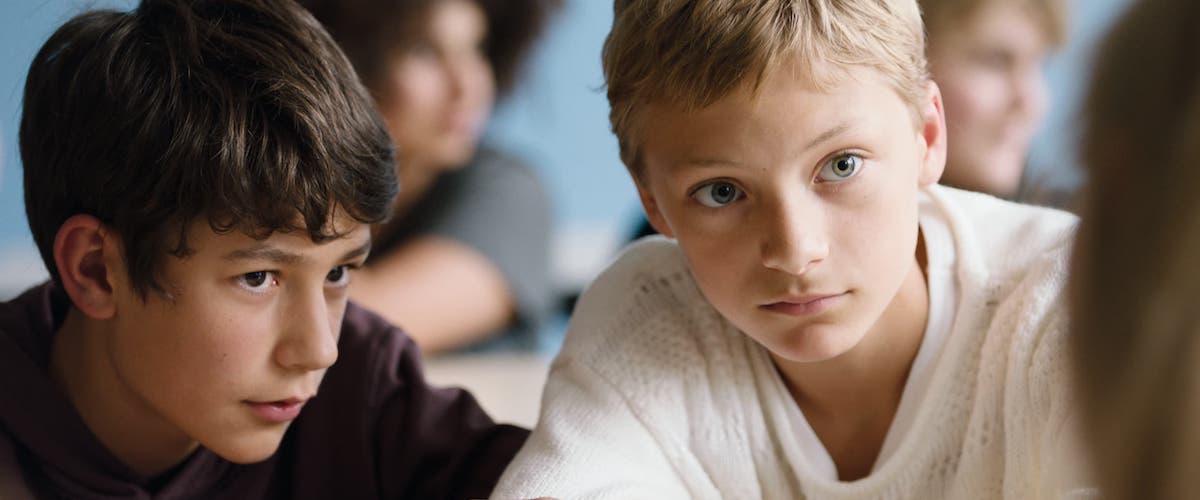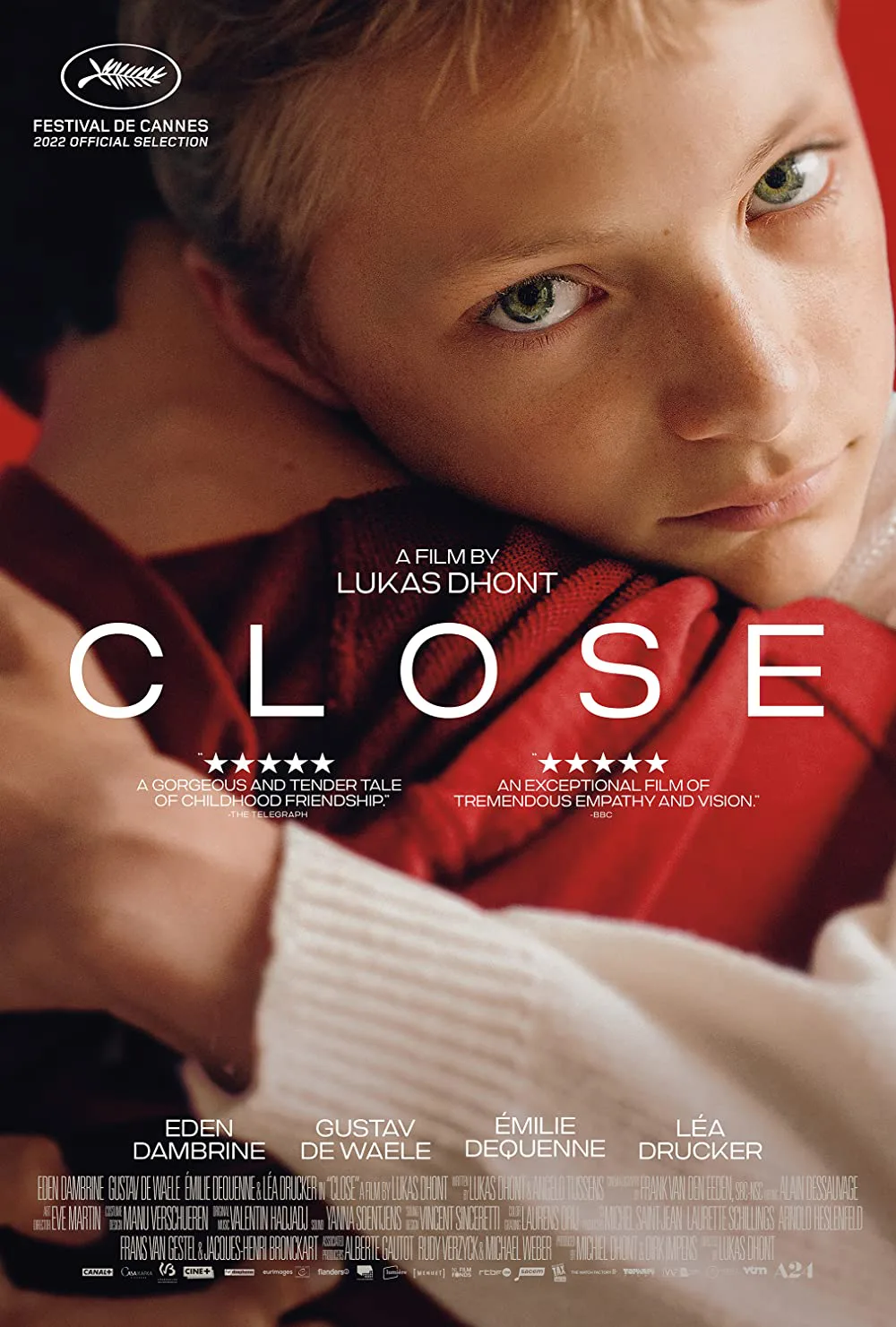“Close,” about two small-town Belgian boys who are as tight as brothers, is a devastating movie. But to what end?
I can’t say what I mean by that question—not at this point—because “Close” is critic-proof, perhaps discussion-proof, if the reader or listener hasn’t already seen it. A pivotal early plot development makes it impossible to discuss at length or in detail, lest the writer be pilloried for “spoilers.” And yet to avoid discussing the rest of the movie is to avoid discussing the movie. So all that remains is handing out compliments to the cast (they are superb, no doubt—especially Eden Dambrine and Gustav de Waele as the young friends) and to director-cowriter Lukas Dhont, who imbues the story with a polished naturalist quality that occasionally evokes Terrence Malick (“The Tree of Life” comes to mind often). Let’s say at the top of this review that, evaluated purely on a craft level, “Close” is a remarkable film with exquisitely modulated performances and imagery, but that the more distance I got from it, the more I resented how carelessly it handles emotionally explosive material of a type that has traumatized so many real-life families, and the more questions I had about what, exactly, the viewer is supposed to take away from the experience.
Léo (played by Dambrine) and Rémi (played by Waele) both grew up on small farms worked by their families. They ride their bikes to and from school every day, and at the end of a workday, one will often go over to the other’s house for dinner and to sleep over. The film’s script, by Dhont and his regular collaborator Angelo Tijssens, characterizes the relationship in a way that allows viewers to superimpose their readings; some have seen this as a queer-coded relationship (one or both boys is gay but perhaps haven’t consciously realized it yet) while for others, it’s about how the innocent, unaffected physicality of younger boys who can share a bed without feeling self-conscious or anxious and can hug, touch, even hold hands in public without feeling disapproving eyes on them, tends to harden and reconfigure itself into cliches of “cool” or seemingly emotionless straight masculinity when they get older, and homophobic classmates conditioned by reactionary parents begin characterizing any display of the earlier behavior as “queer,” and therefore unacceptable.
If a schoolteacher wanted to explain the concept of heteronormativity to children (an idea that would not be allowed in most United States public schools today, thanks to reactionary political interference in local districts) they could screen “Close,” because the movie lays it all out plainly. However one characterizes or codes it, there’s nothing wrong with anything having to do with these boys and their relationship. In any case, it’s nobody’s business but theirs (and their parents’). The movie treats their affection as pure and even heroic, like something from a 19th-century poem about a love so true that it transcends time, culture, and even flesh. Léo adores Rémi—you can see it in the way he looks at Rémi when the latter is practicing his clarinet or soloing at a school recital—and he also loves how Rémi’s family has accepted him as a bonus son. Léo looks at Rémi’s mother Sophie (Émilie Dequenne) the same way, idealizing and practically worshiping her with his gaze.
Rémi seems to feel the same way about Léo and his family. It’s probably not an accident of casting that Léo’s big brother, with his dark hair and eyes, looks like he could be a member of Rémi’s family. Dhont’s filmmaking draws a parallel between the love that Léo and Rémi feel and express for each other and the way their two families seem to blend together both geographically and emotionally (there are two houses, but at times it feels like early part the story is unfolding in one big house). This is love as an eradication of perceived boundaries.
[Spoilers from here]
Then the usual homophobic social garbage comes into play, with both boys and girls at Léo and Rémi’s school asking impertinent and leading questions about their relationship, then escalating to slurs and abuse. Both boys are upset by this, but only Léo begins to alter his behavior as a result, getting in with a new peer group that has organized itself around ice hockey (its leader is a young jock who initiated some of the taunting) and passively rebuffing Rémi’s expressions of friendship and closeness.
The film is at its best in this section of the story. Through Dambrine’s and de Waele’s extraordinarily intuitive and exact performances as much as through the script, we understand that dynamic wherein one person does things that are devastating to someone they love, due to reasons of social pressure, and know deep down that it’s wrong to do it, but keep doing it anyway, and refuse to give explanations when the injured party asks for them because explaining would require justification. There’s no way to justify that kind of selfish meanness.
Rémi’s pain at being rejected by Léo is intense, particularly after a night where Léo gets self-conscious sleeping in the same bed with him and takes a mattress by himself on the floor. The public expression of Rémi’s hurt looks to outsiders like that of a spurned lover, and on some deep level that might be what it is; but these boys are both barely sexual, and not conversant in such terminology, so all they can do is feel.
And then, as you’ve probably already gathered from the ominous but vague warnings at the top and the spoiler warning two paragraphs above this one, Rémi kills himself about a third of the way through the story. The rest of “Close” is about the two families and the community reacting to this awful event.
And it’s here that the movie started to lose me even as I continued to admire its performances, direction, and overall sense of craft.
I haven’t seen too many films about grief that so keenly capture that feeling right after a catastrophic loss where everyone close to the deceased is wandering around looking like they’ve just climbed out of a wrecked car, and spending inordinate amounts of time sitting and staring at nothing in particular. The “life goes on anyway” scenes are strong as well, especially the scenes of Léo growing close to the hockey players who become his friends even though their cruelty helped spark this catastrophe (this is an unhealthy thing that happens in life, unfortunately—sometimes the people who helped cause your grief are the ones who comfort you afterward).
Even more affecting are scenes of Rémi’s mother Sophie seeming to be drawn to Léo, and he to her, in the aftermath—as if she’s realizing that he could be a son to her, a partial consolation for an irreplaceable loss, and her a mother to him. The horror and shock following the loss of a child isn’t something that popular art dares to examine close up with any regularity. Dead children are more often referred to in past tense or used as plot devices (the thing that isn’t talked about until characters finally talk about it). So it’s admirable, in a way, that “Close” decided to go where it went.
But what does it find and show once it has gone there? That’s the question I have no good answer to.
This is, when you get down to it, the story of a horrible thing that happened, that nobody who actually helped cause it can understand (or shows any sign of even wanting to understand), that no one in the dead boy’s immediate circle saw coming or could have prevented, and that smashes two families’ understanding of themselves to pieces. And it leaves poor Léo carrying around an unimaginable and (for him) mystifying burden: he feels like this is all his fault, even though it isn’t. The movie generates suspense by making us wonder when Léo is finally going to tell Sophie that (in his mind) he caused her loss. It finally happens in the last ten minutes of the story, and the dead boy’s family immediately leaves town, and the film ends with poor Léo looking into their now-empty house.
What are we left with, at that point, except the knowledge that this boy is going to feel this for the rest of his life as if through caused the suicide of his best friend and shattered his family? Is there anything else attached to that takeaway beyond a trite formulation like “homophobia is bad, don’t do it”? The director is great at punching audiences in the gut, yes. But there should be more than the punch, the exhalation of breath, and the realization that one has just been punched. And, to nitpick a bit, is it really possible that Sophie (and the rest of that family) would not have put two and two together and figured out that the most likely trigger for Rémi’s impulsive act was his public rejection by the boy he treated as a soulmate?
As focused and controlled as every scene in “Close” is, it feels, in a way, calculated and almost cruel. It could be a reminiscence made many years after the tragedy by one of the boys who tormented Rémi and Léo—except that one would hope that if one of those kids grew up and made a movie like this one, it would not be quite so clinical in its examination of awful things happening to people who did nothing to deserve it; and that it would go deeper into Léo’s story, and show how he did or did not come to understand what actually happened, rather than leaving us with what feels like the start of another movie, one that we may never get to see.




















